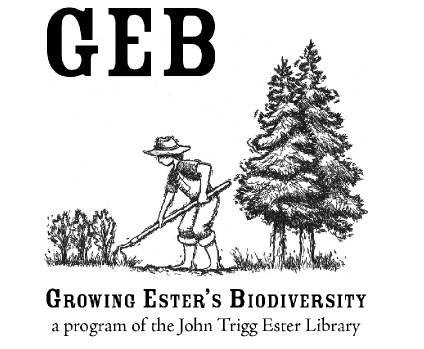
“If you have a garden and a library, you have everything you need.”
~Cicero
Growing Ester’s Biodiversity, or GEB, is a seed library and biodiversity education program at the John Trigg Ester Library. GEB also supports and participates in workshops, reading groups, or other events, including seed swaps.
What is a seed library?
A seed library is a community seed bank and educational tool. It’s an important way to preserve agricultural biodiversity specific to a local region. The public is engaged to preserve heirloom garden varieties and learn about seed saving and starting.
Library members can “check out” seeds from the library to grow in their gardens. At the end of the growing season, members “return” seeds to the library for use next year. You are required to be a member of the John Trigg Ester Library – dues are only $10/year/person or $25/year/family, and you may join at the Library or here. Please see our page on checking out seeds.
What is a seed swap?
Usually held on one or two Saturdays in March/April, it is an opportunity for members of the general public to swap seeds with others. Sometimes, there will be a short talk on a seed saving topic.
About the program
Growing Ester’s biodiversity is a community seed-sharing and educational program dedicated to improving the agricultural self-reliance of the Ester area through seeds and educational materials and events on food security and sustainability issues.
The purpose of the GEB program is to:
- create an accessible and affordable source of regionally-adapted seeds that grow well in the Ester area that is maintained by a local community of caring farmers and gardeners;
- educate library members and the public about biodiversity, garden and plant ecology, sustainable food production, food sovereignty, cultural traditions concerning food and agriculture, heirloom varieties, Ester and Alaska’s agricultural history, and related topics;
- build community awareness and connections through partnerships between the library and local nonprofits, food producers, horticulture businesses, gardeners, educational institutions, health practitioners, artists, and others; and
- strengthen the JTEL’s connections to its community, membership, and volunteers; broaden the relevance of the library to area residents; set an example for other libraries and organizations; and support and supplement the other educational programs of the JTEL
Program partners
The GEB program relies on strong community partnerships. We are forming cooperative partnerships with local agriculturalists and institutions, including:
- Calypso Farm & Ecology Center
- EdibleAlaska
- Goosefoot Farm (Facebook page)
- Pingo Farm / Zone 1 Grown Seeds (no website; contact owner Kurt Wold at 907-479-7977)
- Seed Savers Exchange
- UAF Cooperative Extension Service
- Saving Seeds Will Save and Make You Money (article by Amelia Robinson from her gardening website, Robinson Love Plants!)
Facebook Page: Growing Ester’s Biodiversity


